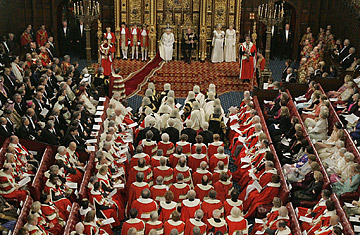
The House of Lords
Britain may have lost some of its olde-worlde charms to the dual forces of modernizing government and globalization, but there's one corner of the nation left largely untouched by progress. Parliament's Upper Chamber, the House of Lords, with its 743 members, including 92 who are there only by dint of their aristocratic lineage, remains a byword for tradition and gentility. Those qualities were at least partially reflected in a recent headline from The Sunday Times: "Whispered over tea and cake: price for a peer to fix the law." According to the article, the polite rituals of afternoon tea accompanied a less rarified interchange. The newspaper claimed that some peers may be willing to amend laws on behalf of business clients for fees of up to £120,000 ($170,000) a year.
The Lords-for-hire allegations came after journalists, posing as lobbyists representing a fictional Asian firm that was setting up a chain of shops in the U.K., approached 10 Lords for help amending business-rates legislation. Three Conservative peers, a Liberal Democrat, an Ulster Unionist and a Labour peer ignored the request or refused to help. But The Sunday Times says four Labour Lords — Lewis Moonie, Peter Snape, Thomas Taylor and Peter Truscott — agreed to help amend the bill in exchange for retainers. Following those allegations, London's Independent newspaper reported that peers are currently being paid to advise more than 200 companies and pressure groups, and The Sunday Telegraph found examples of peers who have officially registered their outside interests with the Lords, but have failed to declare those interests during debates. Peers seem uncertain about what is permitted and what isn't. Lord Martin O'Neill of Clackmannan, who serves as president of an engineering contractors group, withdrew an amendment to a construction bill last week. "To be frank, I didn't really think about it too much," he told The Sunday Times. "Then I read at the weekend the expose and thought, God, I shouldn't be doing this.'"(Read "Lords and Loans".)
The code of conduct for the House of Lords states that members "must never accept any financial inducement as an incentive or reward for exercising parliamentary influence." But peers are unelected, don't receive a salary, and are free to pursue outside income; around 140 have "outside consultancies." There are few sanctions against peers who transgress the rules: they cannot be removed from the house, but merely "named and shamed." That, says Baroness Royall, the Labour leader of the Lords, is "bananas." It's hard to disagree. MPs convicted of criminal offenses or found to commit acts deemed improper can be expelled from the Commons. Jailbird peers, such as novelist and one-time deputy chairman of the Tory party Jeffrey Archer, who served a prison term following a perjury conviction; and Conrad Black, currently in jail for fraud, are still entitled to wear the ermine robes of the peerage and style themselves Lords.
The current furor recalls earlier parliamentary scandals. In 1994 the Conservative party was rocked by another Sunday Times exclusive, alleging that two parliamentarians had accepted bribes in exchange for asking parliamentary questions. In 2006, the Labour party was embroiled in an investigation into accusations of peerages being dangled in front of wealthy donors to secure loans. No charges were ever brought but the episode adds to sensitivities about the House of Lords. In 1997, Labour came to power promising to abolish hereditary peers. In 1999, it expelled most of the hereditary peers, but attempts to complete the reforms by replacing the Lords with a partially or wholly elected Upper Chamber have run into the sand. In May 2008, Gordon Brown announced that the government would issue a report updating its position on Lords reform, but it has not yet materialized.
Justice Minister Jack Straw, who has led past government attempts to push through reforms, spoke out at the weekend, promising fresh focus on the issue, adding, "We want to see very, very clear laws brought in that deal with misconduct by members of the House of Lords so that if they commit a criminal offense or something else which is wholly improper then they can be expelled."
The peers identified by the Sunday Times deny acting improperly, and Lord Truscott has said he knew the supposed lobbyist was an undercover reporter and was simply stringing him along. In video footage posted on the Sunday Times website, Truscott boasts of his connections and explains what his work would entail: "It is. . .identifying people. . .meeting people, talking with people to facilitate the amendment and making sure the thing is granted," he says. "I think the other thing is identifying. . .who can be approached to put forward amendments at various stages and maybe other bodies to contact." In an audio clip, his colleague Lord Taylor tells an undercover reporter that "some companies that I work with would pay me £100,000 a year" to facilitate meetings with decision-makers. When questioned by the reporter about that fee, Taylor says: "That's cheap for what I do for them. . .I am not exaggerating. It's whether I want to do it or not. You've got to whet my appetite, to get me to come on board. . ."
"I want to stress that this house, despite what people may think from the coverage in the past week, is a house full of people who in the vast majority of cases do a bloody good job," Baroness Royall told the Sunday Times on Feb. 1. Despite the bad press it occasioned, the original Sunday Times article in some ways supports her view. When Lord Rogan, the Ulster Unionist, was approached by the reporters masquerading as lobbyists, his response was clear-cut. "If your direct proposal is as stark as for me to put down an amendment that's a non-runner," he said. "A, it's not right and B, my personal integrity wouldn't let me do it."
